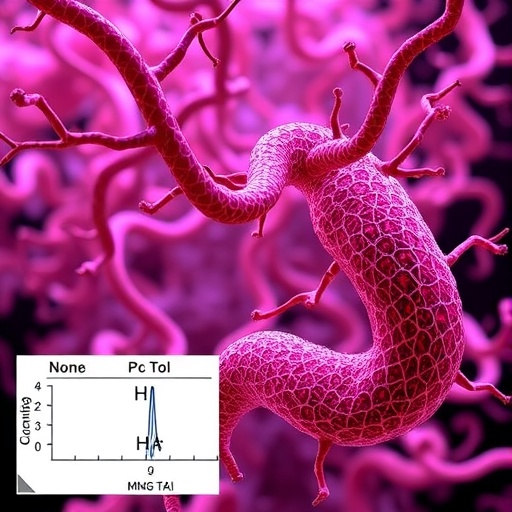In a groundbreaking new study published in Nature Communications, researchers have unveiled a previously underappreciated mechanism driving the aggressive adaptability of pancreatic cancer cells. The team, led by Dobersch, Yamamoto, and Schutter, sheds light on the complex interplay between the chromatin architectural protein HMGA2 and a novel post-translational protein modification known as leucine methylation, which together orchestrate the remarkable lineage plasticity characteristic of this lethal disease. This discovery not only deepens our molecular understanding of pancreatic cancer’s notorious treatment resistance but also opens up promising avenues for targeted therapeutic interventions.
Pancreatic ductal adenocarcinoma (PDAC) remains one of the deadliest forms of cancer, with dismal survival rates and a notorious ability to evade conventional treatments. One key factor driving its malignancy is lineage plasticity—the capacity of cancer cells to switch identities, effectively reprogramming themselves to survive under therapeutic pressures. Yet, the molecular determinants of this remarkable cellular flexibility have long eluded scientists. The current study identifies two major players in this process: HMGA2, a known architectural regulator of chromatin, and a little-explored methylation event on leucine residues of cellular proteins.
HMGA2 has previously been implicated in various cancers as a gene that reshapes chromatin conformation to influence gene expression profiles. However, the precise mechanisms by which HMGA2 enhances pancreatic cancer plasticity were unclear. Through a combination of genomic and proteomic approaches, Dobersch and colleagues demonstrate that HMGA2 functions synergistically with a newly characterized enzymatic pathway that installs methyl groups on leucine residues—an unconventional amino acid methylation unlike the more commonly studied lysine or arginine modifications.
Leucine methylation emerged as a surprising epigenetic regulator. The team employed advanced mass spectrometry and methylation-specific antibodies to detect and quantify this modification, revealing its widespread presence in PDAC cells with high HMGA2 expression. This finding suggests that leucine methylation acts as a molecular switch, modulating the activity and stability of a subset of proteins involved in cellular identity and fate decisions.
By integrating chromatin immunoprecipitation sequencing (ChIP-seq) with transcriptomic profiling, the researchers showed that HMGA2 binds to regulatory regions of genes crucial for maintaining pancreatic cell differentiation states. Concurrently, leucine methylation modifies transcription factors and chromatin remodelers, fine-tuning their function to promote dynamic gene expression changes. This coordinated regulation enables cancer cells to adopt alternative lineage programs, effectively circumventing growth arrest triggered by chemotherapeutic agents.
The study also dissected how blocking either HMGA2 or the leucine methylation process impacts pancreatic cancer cells’ adaptability. In vitro and in vivo experiments revealed that disrupting HMGA2 expression or chemically inhibiting the leucine methyltransferase enzyme significantly reduced lineage switching. Consequently, treated tumors displayed increased sensitivity to standard chemotherapy regimens, underscoring the therapeutic potential of targeting this axis.
Notably, the leucine methyltransferase involved belongs to a distinct subclass of methyltransferases with unique substrate specificity, setting it apart from classical epigenetic writers. Structural analysis provided insights into the enzyme’s active site architecture, revealing amino acid residues critical for recognizing leucine motifs. This information paves the way for rational drug design efforts aimed at developing selective inhibitors with minimal off-target effects.
In addition to conventional cancer cells, the researchers observed that pancreatic cancer stem-like cells—often implicated in relapse and metastasis—also rely heavily on the HMGA2-leucine methylation axis. These stem-like populations exhibited elevated levels of HMGA2 and enhanced leucine methylation patterns, suggesting that this mechanism supports their maintenance and expansion within the tumor microenvironment.
The work also explores the interplay between HMGA2-leucine methylation signaling and well-known oncogenic pathways such as KRAS and TGF-β, revealing intricate crosstalk. HMGA2 appears to act downstream or in parallel to these hubs, integrating external cues and intracellular stresses to recalibrate cell identity programs. This molecular convergence offers opportunities to develop combinatory treatment modalities that simultaneously block multiple pathways sustaining cancer plasticity.
The discovery of leucine methylation as a critical modification expands the repertoire of epigenetic marks influencing tumor biology. Until now, leucine methylation has been understudied due to technical challenges and a lack of appropriate reagents. This study provides a conceptual and methodological framework enabling future researchers to investigate leucine methylation in other cancers and diseases characterized by cellular plasticity.
Researchers also noted that HMGA2 expression correlates with poor prognosis in clinical PDAC samples, validating its relevance beyond experimental models. The methyltransferase responsible for leucine methylation similarly showed elevated activity in patient-derived tumors, reinforcing the translational significance. Together, these biomarkers could potentially serve as predictive indicators for patient stratification and response monitoring in clinical trials.
Importantly, the authors emphasize that the HMGA2-leucine methylation axis represents a dynamic system modifiable by both genetic and environmental factors. Stress conditions such as hypoxia and nutrient deprivation appeared to amplify this pathway, suggesting that tumor microenvironmental conditions can further drive cancer plasticity. Therapeutic strategies combining metabolic modulation with epigenetic interference may therefore prove synergistic.
This research exemplifies the power of integrative multi-omics analyses combined with cutting-edge chemical biology tools to unravel complex cancer phenotypes. It challenges traditional views of the epigenome by introducing non-canonical methylation marks as key regulators of tumor evolution. As understanding grows, such discoveries promise to revolutionize how we conceptualize and treat malignancies notorious for their adaptability.
In conclusion, the compelling findings presented by Dobersch, Yamamoto, Schutter, and colleagues deliver a paradigm-shifting perspective on pancreatic cancer biology. By delineating the cooperative roles of HMGA2 and protein leucine methylation in driving lineage plasticity, this work lays a critical foundation for next-generation therapies targeting the epigenetic machinery that fuels cancer resilience. As PDAC continues to represent a formidable clinical challenge, these insights kindle hope for more effective, precision medicine approaches that can outmaneuver this devastating disease.
Subject of Research: Pancreatic cancer lineage plasticity driven by HMGA2 and protein leucine methylation mechanisms
Article Title: HMGA2 and protein leucine methylation drive pancreatic cancer lineage plasticity
Article References:
Dobersch, S., Yamamoto, N., Schutter, A. et al. HMGA2 and protein leucine methylation drive pancreatic cancer lineage plasticity. Nat Commun 16, 4866 (2025). https://doi.org/10.1038/s41467-025-60129-1
Image Credits: AI Generated




